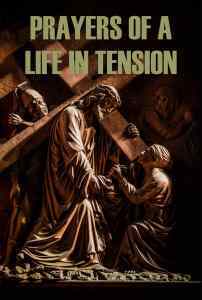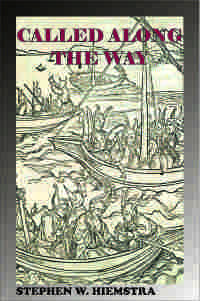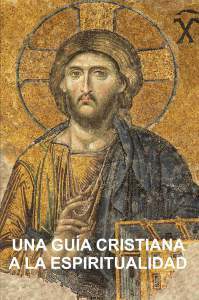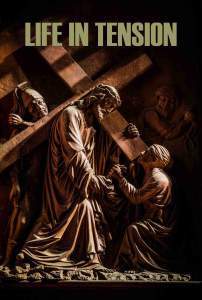Stephen W. Hiemstra's Blog, page 254
November 15, 2015
3. Prayers of a Life in Tension by Stephen W. Hiemstra
 Father God,
Father God,
We thank you for your willingness to break into our little worlds.
Break our obsession with ourselves,
The person that we know so well, but have trouble being truthful to.
Shine your light into the darkness, drive the cloud of despair away,
Help us to accept your Gospel,
to engage it, to live it, to share it.
To walk across the bridge between ourselves and others,
To bridge the gap between us and you.
By the power of your Holy Spirit,
Make us whole people again,
In Jesus’s name, Amen.


November 13, 2015
Pammel Court, Dog, and Yellow Wax Beans
What are you doing here, Elijah? (1 Kings 19:13 ESV)
Pammel Court
By Stephen W. Hiemstra
I ran, ran, ran.
Mom was in the other room and the door was open.
So I ran, ran, ran.
I ran around the buildings—
The corrugated alleys [1] that I had played in many times.
Around and around.
I found an open door and in I ran.
There was a bulletin board in front of the counter.
And pool tables everywhere.
And Mom came to pick me up.
§
In you our fathers trusted; they trusted, and you delivered them. (Ps 22:4 ESV)
Dog
By Stephen W. Hiemstra
The apartments were a playground—
A guinea pig lived underneath the recreation center that was across the street and down a ways
Behind the recreation center was a baseball field and then a creek with soft black mud which disappeared in a tunnel under the road.
The creek was mysterious.
I remember being tempted there—a friend dared me to step into the water deeper and deeper.
I remember he left pictures of a woman without any clothes—down in the creek.
She must have been really poor…
Among the apartments, not down so far, was a tree that I used to climb.
It wasn’t very tall and I could not climb it very high.
But a mad dog chased me there one day and I climbed that tree.
That dog bit a girl I knew and she had to have stomach shots.
§
For to me to live is Christ, and to die is gain. (Phil. 1:21 ESV)
Yellow Wax Beans
By Stephen W. Hiemstra
I like yellow wax beans.
They are easy to weed
and grow in all kinds of different soil.
Grandma packed them in plastic containers every summer
and put them in the freezer
and we ate them all year.
Apples make good sauce
and peaches require canning.
Chickens require cleaning.
But I always went for the yellow wax beans
when Grandma sent me to the basement to grab something for dinner.
[1] The quonset huts in Pammel court were built during the second world war by the military. http://www.ameshistory.org/exhibits/tribune/10/wf_1008.htm.


November 8, 2015
2. Prayers of a Life in Tension by Stephen W. Hiemstra
 Almighty Father, Beloved Son, Ever-present Spirit,
Almighty Father, Beloved Son, Ever-present Spirit,
We give thanks for the work of Jesus Christ,
Who lived, suffered, died, and rose from the dead
That the Gospel might live to us.
May we know him and his power, share in his suffering and his death,
That we might also be resurrected with him into new life (Phil 3:10-11).
Break the power of sin in us,
Empower us to live in reconcilation to one another,
Grant us words to lift up in prayer to you.
All the days of our lives. In Jesus’ precious name, Amen.


November 6, 2015
Tractor
 And if in spite of this you will not listen to me,
And if in spite of this you will not listen to me,
then I will discipline you again sevenfold for your sins,
and I will break the pride of your power …
And your strength shall be spent in vain (Lev 26:18-19 ESV).
By Stephen W. Hiemstra
I loved to stand in the back seat of my Dad’s lime green 1953 Chrysler
and look over his shoulder as he drove.
I could see everything!
As a I stood there, I imagined driving my own car—
not a bicycle or a vespa or a pickup
but a great big powerful car, with a shinny hood ornament, white-walled tires,
and plenty of head room for my fedora—just like Dad’s.
But sometimes Fords are good too—Grandpa drove a Ford.
Chrysler’s don’t like hills and rural route 2 outside Osky is mostly gravel and hills.
I saw everything.
Dad drove up the hill; then, he rolled back down.
Dad drove up the hill; then, he rolled back down again.
Then, he just parked the car next to the post box and walked up the hill in the snow.
I offered to come along but he told me to wait in the car and take care of my Mom and sister.
I thought it was odd that our great big powerful Chrysler would be bothered by a little hill.
After a bit, Grandpa drove down the hill with his Ford 2N.
Dad saw everything
looking over his shoulder
while he stood on the swinging drawbar in the back.
They hooked up the car to the tractor with a chain and towed it up the hill to the house.


November 1, 2015
1. Prayers of a Life in Tension by Stephen W. Hiemstra
 Holy Spirit,
Holy Spirit,
I renounce the sin in my life that separates me from God
And grieve that separation.
I believe in Jesus Christ, the son of the living God,
who died for our sins and was raised from the dead.
Come into my life, cleanse me of my sin,
Renew your spirit within me
So that I will not sin any further
Break any chains that bind me to the past—
Be they pains or sorrows or grievous temptations,
That I might freely welcome God, the father, into my life,
Who through Christ Jesus can bridge any gap and heal any affliction,
Now and always.
In Jesus’ previous name, Amen.


October 30, 2015
Ever Present, Snow, and Grandpa’s Farm in Iowa
 The LORD is my shepherd; I shall not want. (Ps 23:1 ESV)
The LORD is my shepherd; I shall not want. (Ps 23:1 ESV)
Ever Present
By Stephen W. Hiemstra
Time awake. No tomorrow; no yesterday. A continuous present.
Every waking hour is new; Mom is there.
I am happy or alone. Loneliness is being in bed looking out over the covers.
The alligator under my bed comes out at night after the records play.
The alligator chases me around the room and runs away when Dad comes.
§
And the LORD God made for Adam and for his wife garments of skins and clothed them. (Gen 3:21 ESV)
Snow
By Stephen W. Hiemstra
Snow is for jumping in and for making into balls and throwing.
Mom, why do I need a jumpsuit, a knit cap, and mittens?
… Because the porch is cold and it is even colder outside.
But I don’t like mittens. Why can’t I wear gloves like you and Dad?
… These mittens were a gift made for you by your grandmother—see she made attached them together with a string so that you won’t loose them. When you get older, we will get you some gloves—gloves are made from leather and you can’t use them to make snowballs without ruining them. So for now, you need to use mittens!
Mom, I can put my shoes on myself! …
§
Now the LORD said to Abram, Go from your country and your kindred and
your father’s house to the land that I will show you.
(Gen 12:1 ESV)
Grandpa’s Farm in Iowa
By Stephen W. Hiemstra
I’m going to Grandpa’s farm in Iowa.
Wandering up and down the aisles on the California Zephyr. People asked me and I told them—
I’m going to Grandpa’s farm in Iowa.
From Emeryville to Ottumwa. Snow on the Rockies; the deep ravines; the scary dark tunnel. But mostly, I remembered that—
I’m going to Grandpa’s farm in Iowa.
Why did people always lean forward in their seats to ask me—where y’a going?—and smile when I tell them?
Why did I always smile in thinking about it?
Maybe it was the cats. Married student housing did not allow pets. Besides, cats got to have birds and mice and wild stuff to eat…
Maybe it was the mulberry trees. Berry trees are special and especially hard to find in the city. Somehow, I don’t think city folks even know about mulberries—they seem more like blueberry people.
Maybe it was Grandma’s chicken and noodles or the box of chocolate chip cookies in the fridge. Mom fixed some great macaroni and cheese, but store-bought cookies are always dry and crunchy.
I smile thinking on the farm, ‘cause there were pumps to pump; snow drifts to jump in; relatives to visit; Christmas church services to dress up for. Everyday was an adventure on the farm, but the reason I smile is because on the farm I felt special.
I’m going to Grandpa’s farm in Iowa.
[1] http://www.amtrak.com/california-zeph....


October 25, 2015
Prayer Day 50: A Christian Guide to Spirituality by Stephen W. Hiemstra

Disponible en Amazon.com
Loving Father. Thank you for forgiving us and accepting us back as sons and daughters. Grant us teachable hearts, discerning minds, and strength for each new day. In the power of your Holy Spirit, reveal to us the stumbling blocks that impede our progress as faithful servants. In Jesus precious name, Amen.
Padre Amoroso, gracias por perdonar y aceptarnos como hijos e hijas de nuevo. Concédenos corazones enseñables, mentes con discernimiento, y fuerza para cada día nuevo. En el poder del Espíritu Santo, muéstranos las piedras de tropiezo que impiden nuestro progreso como siervos fieles. En el precioso nombre de Jesús oramos. Amén.


October 23, 2015
Looking Back
One of the ironies of life is that we are naturally strangers to ourselves. Our desires, motivations, and purposes lie behind a veil that we dare not pull back for fear of what might lie beyond. This fear cloaks our shadow side in mystery. It also limits our potential, our relationships with others, and our relationship with God. Pulling back the veil accordingly offers the hope that we realize our potential, become comfortable in the presence of others, and welcome God more fully into our life. My purpose in composing an autobiography is to lift this veil.
We experience life through the experience of time. The Greeks experienced time in two primary dimensions. The first dimension, chronos time (χρόνος), is measured in equal units: seconds, minutes, hours, days, weeks, months, years, and centuries. The second dimension, chairos time (καιρός), is a decision moment or crisis[1]. When we look at our wristwatches or calendar, we experience chronos time. When we crash our car or meet God, we experience chairos time. We normally think and move through chronos time. We normally feel and remember chairos time. This book is organized around chronos time, but the memories that fill it are mostly kairos moments.
I remember my early years in vignettes. These vignettes appear like electronic photographs without a time and date stamp. The stories that I tell about those vignettes are mostly the spin that came later reflecting on them. For this reason, these vignettes are best expressed in poetic form. Here we find kairos moments of a child who has not yet learned the discipline of chronos time. Objective thought, which requires some distance between the object and the thought, is also mostly absent and unlearned. Chairos time is chaotic, messy, embarassing. In a word, it is subjective. If the subject is your dark side, then you expect to find dark things. Honesty in this terriority is aspirational. Poetry helps overcome obvious tensions.
One area where I cannot be entirely straightforward is in revealing personal details about the people around me. I can sign onto the journey of self-revelation. I cannot presume that my family and friends share my objectives in this respect. Their roles in this narrative will either be cloaked or absent. Please understand. This autobiography is not an exposé.
In my first book, A Christian Guide to Spirituality, I examined four questions in the context of the traditional teaching of the church:
1. Who is God?
2. Who are we?
3. What do we do about it?
4. How do we know?
The objective in that text was especially to explore the first question: Who is God? My second book, Life in Tension, likewise has that focus. This book focuses on the second question: Who are we? While this book focuses on my history, I am, in part, a stand in for the reader. It is my hope that in telling my own story that I will also help you tell yours.
[1] Both words appear in the Greek in this verse: “He said to them, “It is not for you to know times or seasons that the Father has fixed by his own authority.” (Acts 1:7 ESV)
[2] My thanks to Kreeft (2007) for highlighting these four questions.
REFERENCES
Hiemstra, Stephen W. 2014. A Christian Guide to Spirituality. Centreville: T2Pneuma Publishers LLC.
Kreeft, Peter. 2007. The Philosophy of Jesus. South Bend, IN: Saint Augustine’s Press.


October 18, 2015
Prayer Day 49: A Christian Guide to Spirituality by Stephen W. Hiemstra

Disponible en Amazon.com
Heavenly Father, beloved Son, Holy Spirit. We thank you that you do not leave us alone and that you care for us. Inspire our hearts and illumine our minds so that we can be light in a dark and confusing world. In Jesus’ precious name, Amen.
Padre Celestial, Hijo Amado, Espíritu Santo, te agradecemos por no dejarnos sólos y por preocuparte por nosotros. Inspira nuestros corazones e ilumina nuestras mentes para poder ser luz en un mundo oscuro y confuso. En el precioso nombre de Jesús oramos. Amén.


October 16, 2015
The Road Ahead
 that I may know him and the power of his resurrection, and may share his sufferings, becoming like him in his death,
that I may know him and the power of his resurrection, and may share his sufferings, becoming like him in his death,
that by any means possible I may attain the resurrection from the dead. (Phil 3:10-11 ESV)
By Stephen W. Hiemstra
In writing about the movements of the spirit in our lives, I have used both the descriptive term, gap, and the subjective term, tension. Our minds observe an arm’s length gap but our hearts feel intimate tension because our lives require commitments—we are vested in the things we do, the places we live, and the people with whom we live. This is true even when we aspire to transform our lives and work with the Holy Spirit to close the gaps. Such is the nature of the sanctification process; such is our journey as Christians.
An important lesson that Jesus confers on his disciples in the Beatitudes takes the form of an attitude about the process—we are to be humble in all that we do. Humility is important for the Christian not merely as an outward expression but also as a character trait at the core of our being. When the onion is peeled to its core, there we find humility. Christian obedience, through persecution and even in death, is possible because we have surrendered our lives to Christ and we know in the depths of our souls that the future lies in Christ. So the onion gets peeled and its core is revealed, and we find at the core what we see on the skin—humility.
Here we also see the importance of Christian hope. We share the shalom of Christ expecting persecution and rejection. But our hope remains because we know the end of the story is with Christ. This is the fruit of the resurrection. A soldier is issued a gun and does not expect to leave the battlefield without firing it—Christ is an honest leader who shares with his disciples the unvarnished truth of persecution. We have been given the shalom of Christ and share it gladly having counted the cost.
Probably the hardest lesson for modern and postmodern people concerns our relationship with God. In our natural selves, we scoff at zeal, distain offering or requesting mercy, and think of holiness as old fashioned. After all, we delude ourselves, we have grace and have no need of law. But Jesus says otherwise. Fulfilling all righteousness is impossible without the Holy Spirit and impossible without trying. So we must place our faith in Christ and emulate his life and death so that we might somehow also attain the resurrection (Phil 3:10-11).





